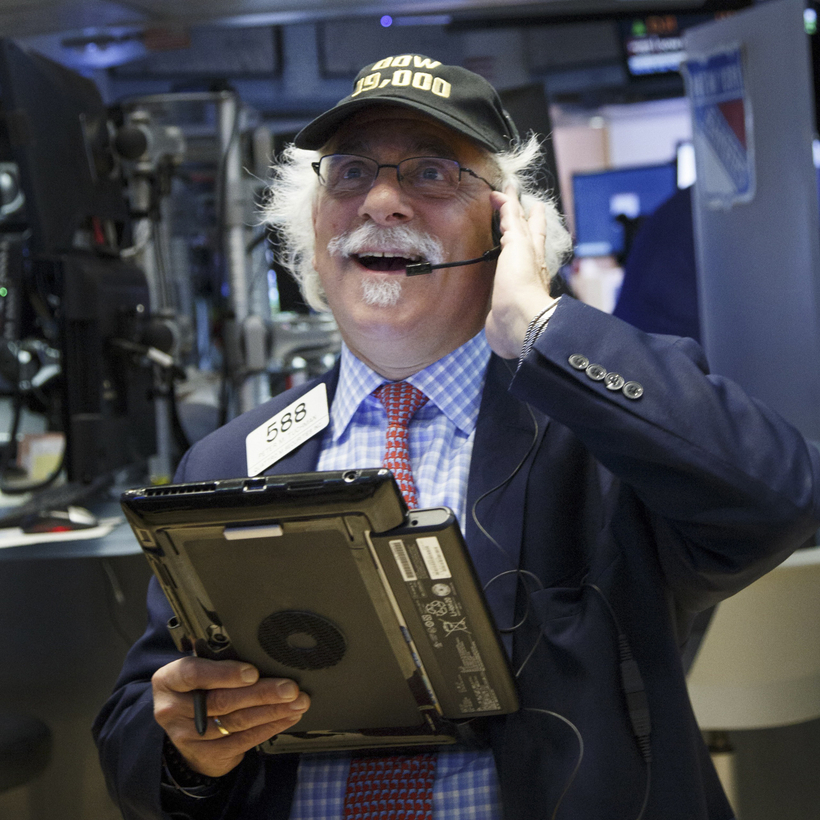If you’ve ever flipped on CNBC on one of those gloomy days when the stock markets are tanking, you’ve seen Peter Tuchman. He’s the fellow with the navy-blue jacket, Hermès tie, silver goatee, and the wild-ass protrusions of white hair on either side of his bald pate that give him more than a passing resemblance to a cross between Albert Einstein and what Larry Fine would look like if the Three Stooges were still in circulation.
He’s the one the cable-TV cameras like to focus on, the number 588 pinned to his lapel, looking particularly concerned, standing on the well-trodden floor of the New York Stock Exchange, even though in his 35 years as a floor broker he’s never owned a share of stock. He has been called the “most photographed man on Wall Street.”

Tuchman has certainly lived through more than his share of drama down at the left ventricle of capitalism. A year after he started came Black Monday, when the Dow Jones Industrial Average collapsed 22.6 percent in one trading day on October 19, 1987. He was there for the Credit Crunch of the early 1990s; the demise of the once-powerful hedge fund Long-Term Capital Management, in the late 1990s; the bursting of the Internet bubble, in April 2000; the tragedy of September 11; and the financial crisis of 2008.
Tuchman watched as the hordes of (mostly) male floor brokers, scurrying around from trading station to trading station, gave way to computerized trading and the transformation of the floor of the exchange into what looks more like a Disney soundstage than it does anything else. On many days, it seems the only people panicking on the floor are the disoriented guests hoping to make it to CNBC or Fox Business in time for their afternoon hits.
He’s watched as the exchange itself morphed from a 205-year-old private partnership, owned by those with “seats”—brokers used to trade sitting down, as difficult as that may be to believe—to a publicly traded company, and was eventually owned by something called the Intercontinental Exchange, or ICE, with a market value of around $72 billion these days and whose billionaire founder, Jeffrey Sprecher, is married to former U.S. senator Kelly Loeffler.

Then came the pandemic, which really gave Tuchman, the child of Holocaust survivors, a Job-like test. For starters, the virus nearly killed him. It was early March 2020. His father had just died, and he decided to take his son, who works with him now, skiing in Vail, which had been a Tuchman-family tradition for 40 years. With the first rumblings of trouble with the virus beginning to circulate more widely, he wondered if he should just cancel the skiing trip. But he decided to go.
They spent five days in Vail. There was a woman on the plane who was breathing on him. A few days later, he was feeling sick. “I knew the minute I got it,” he tells me, during a pre-Omicron interview on a balcony overlooking the floor of the stock exchange. He had a fever of 103.7 degrees for three and a half weeks. He had meningitis. He temporarily lost 80 percent of his memory. He developed severe connective-tissue disease. He had tumors in his feet. He still can’t taste and has trouble swallowing.
A cross between Albert Einstein and what Larry Fine would look like if the Three Stooges were still in circulation.
He’s had seven surgeries to rebuild his cervical spine, which collapsed because of the meningitis. Tuchman had the coronavirus for nearly five months. The exchange referred him to two Chinese doctors. He never went to the hospital. “There were nights I was probably hours away from dying,” he recalls. “I couldn’t breathe.” Some doctor friends coached him regularly about how to get on his knees to expand his lung capacity to sufficiently take in air. He didn’t get a negative coronavirus test until the fourth quarter of 2020. He survived.
These days, more than a year after his ordeal, Tuchman seems the very picture of health, with a radiating, infectious, kinetic energy. He’s decided to put his new lease on life to good use. Unlike many of his peers, he’s embracing the new generation of day traders that the pandemic swept into the stock markets through trading platforms, such as Robinhood, and information exchanges, such as Wall Street Bets, on Reddit. He’s not quite sure he understands the logic driving up the so-called meme stocks, such as GameStop, AMC, even Tesla. But he likes the enthusiasm the new traders have for stocks and for trading.

“What ended up happening was this incredible democratization of the trading community,” Tuchman explains to me. “All those barriers to entry that used to make one an accredited investor or not are suddenly gone. Everyone with 10 bucks and an iPhone can trade the market. Well, that’s unheard of. That’s never happened in our 100 years of trading.”
He wanted to use his understanding of the markets to inform the newbies about the excitement of the markets—as well as about their dangers. He had no axe to grind. He just had his wisdom to impart: Stocks can go down as well as go up. No one ever went broke taking a profit. Just because you buy a stock at $30 a share and it goes up to nearly $500 a share doesn’t mean it’s going to go to the moon. Trees don’t grow to the sky. “Executing a losing trade is just as important as executing a winning trade,” he explains. “Most people are really getting hurt here.”
He worries that, as usual, the media is focusing on “the guys with stacks of thousands on their Bugatti who bought GameStop at two and sold it at 300” and that we’re not hearing about the 90 percent of the day traders who “mortgaged their grandmother’s house” and then “blew it up” and now are broke “because they don’t understand how the market works.”
He teamed up with a longtime friend, trader David Green, whom Tuchman has known since 1985, to create the Wall Street Global Trading Academy. For $499, Tuchman and Green impart their trading knowledge, in a six-hour course, and offer up weekly Zoom sessions to answer questions, review trades, and provide mentorship.

“These kids are not degenerates,” Tuchman continues. “They’re just young, inexperienced people who have seen some really cool opportunity out here. And it behooves me, as somebody who’s been around for a long time, to embrace them, educate them, curate them. How cool would it be if this will be the next generation of people who become responsible traders?” He wants the story of the influx of new traders into the financial markets to have a happy ending. “I don’t want you to come to my party, get drunk and get sick, and then leave blaming me that I gave you too much booze,” he says. “I want you to come here and give me the opportunity to embrace you and curate you.”
That’s not all Tuchman is embracing. He’s also taken to the whole non-fungible token, or NFT, craze. After some hesitation, he’s joined with two NFT collections—Wall Street Bulls, and Boss Beauties—to help raise money by selling NFTs in order to educate young traders about the financial markets. He believes NFTs that raise money for good causes will be the ones that survive long term and the ones that are “just penguins on an iPhone” will fade away. Tuchman’s NFT, with the Wall Street Bulls, is a caricature of him as a brown bull (crazy hair and all) riding on a rocket and holding an iPad—all set against a purple background, with dollar bills floating in the sky around him.
With that, Tuchman was off. A German television show wanted to interview him. And the new trading day was in full swing. “Put your big-boy pants on and take this seriously, and it can be a successful thing,” he imparts to me as he heads back onto the trading floor and I head to the exit and back onto Wall Street.
William D. Cohan is a Writer at Large for AIR MAIL and the author of such best-selling books as The Last Tycoons, House of Cards, and The Price of Silence. He is a founding partner of Puck. His new book, Power Failure, will be published in November


